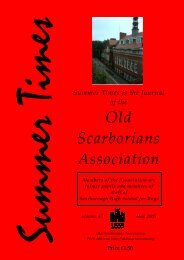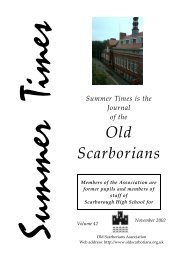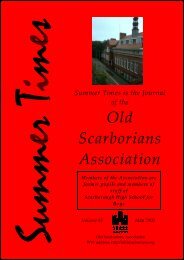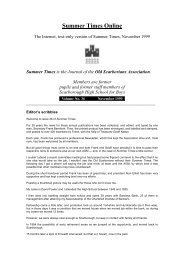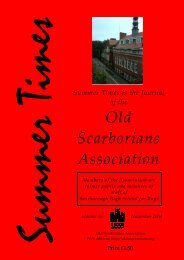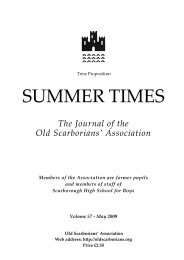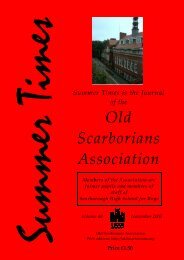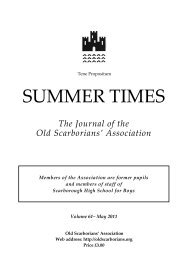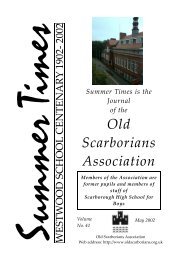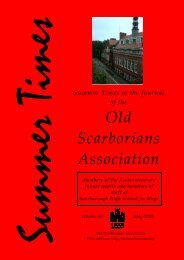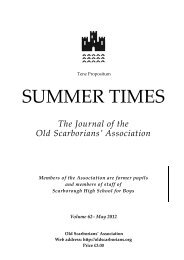Summer Times is the Journal of the Old Scarborians Association
Summer Times is the Journal of the Old Scarborians Association
Summer Times is the Journal of the Old Scarborians Association
Create successful ePaper yourself
Turn your PDF publications into a flip-book with our unique Google optimized e-Paper software.
had tried to persuade me, as he had many<br />
o<strong>the</strong>rs, to go into teaching. At <strong>the</strong> time I<br />
couldn’t think <strong>of</strong> anything less attractive,<br />
possibly remembering how we had all played<br />
up some <strong>of</strong> our masters. Prior to joining <strong>the</strong><br />
bank I had applied for, and been <strong>of</strong>fered a<br />
junior position at <strong>the</strong> “Evening News”. I sus‐<br />
pect <strong>the</strong> excitement generated in 3L when we<br />
put toge<strong>the</strong>r a form magazine with <strong>the</strong> en‐<br />
couragement <strong>of</strong> Gerald Hinchliffe, had proba‐<br />
bly got into my blood and <strong>the</strong>re mixed with<br />
what was <strong>the</strong>re already; my grandfa<strong>the</strong>r had<br />
been an author. However, I turned down <strong>the</strong><br />
<strong>of</strong>fer, feeling ra<strong>the</strong>r dejected that, at my inter‐<br />
view I was only asked one question before<br />
being <strong>of</strong>fered <strong>the</strong> job—“How do you spell<br />
“Rhubarb?”<br />
I started work in <strong>the</strong> Bank in <strong>the</strong> days when<br />
ball point pens were not permitted, and ink<br />
had to be mixed from a special ‘light‐fast’<br />
powder; and blotting paper, pen nibs and ink<br />
had to be changed every Monday morning. I<br />
well remember <strong>the</strong> <strong>the</strong>n Manager, who lived<br />
above <strong>the</strong> branch, panicking when he was<br />
told <strong>the</strong> first girl ever to join our <strong>of</strong>fice would<br />
be arriving in a week. “What shall we do<br />
about toilets when M<strong>is</strong>s Scott arrives? We<br />
only have one, and that one has glass in <strong>the</strong><br />
door panels.” The problem was solved by<br />
sticking brown paper over <strong>the</strong> already frosted,<br />
glazed door panels (possibly to stop M<strong>is</strong>s<br />
Scott seeing in!), and allowing her to use <strong>the</strong><br />
Manager’s facilities in h<strong>is</strong> flat.<br />
In those days <strong>the</strong>re were no Security vans<br />
trundling round delivering and collecting<br />
cash. If we had a surplus, as we usually did,<br />
we did “swops” with o<strong>the</strong>r banks if it was<br />
coin, or mailed it to <strong>the</strong> Bank <strong>of</strong> England if it<br />
was paper. Dad’s Army really springs to<br />
mind. We had to parcel up <strong>the</strong> notes, to a<br />
maximum <strong>of</strong> £5,000, which was considerable<br />
in <strong>the</strong> 1950’s, tie <strong>the</strong> parcel with string, add<br />
sealing wax over <strong>the</strong> knots, address <strong>the</strong> parcel<br />
to The Bank <strong>of</strong> England, <strong>the</strong>n stick bright red<br />
and white “HVP” labels all over <strong>the</strong> parcel. It<br />
11<br />
didn’t take O levels or even <strong>the</strong> 11 plus to<br />
work out that th<strong>is</strong> stood for “High Value<br />
Packet”. Then, a taxi or sometimes <strong>the</strong> Man‐<br />
ager’s decrepit car, took us to <strong>the</strong> Aberdeen<br />
Walk Post Office where we queued to get a<br />
receipt for our parcels <strong>of</strong> money.<br />
In 1957 I was called up for 2 years National<br />
Service. I had opted for <strong>the</strong> RAF, in which my<br />
fa<strong>the</strong>r had served during <strong>the</strong> war, but <strong>the</strong>y<br />
were only taking people who would sign up<br />
for 3 years, and that would have meant losing<br />
<strong>the</strong> guarantee from <strong>the</strong> bank <strong>of</strong> keeping a job<br />
open for me. So <strong>the</strong> Army it was. I started<br />
training as a Technical Ass<strong>is</strong>tant at Park Hall<br />
Camp in Oswestry – <strong>the</strong>re was no choice <strong>of</strong><br />
trade and we were all told what our training<br />
would be, possibly from aptitude tests we<br />
took. After 6 weeks <strong>of</strong> learning how to work<br />
out <strong>the</strong> necessary angles and settings for <strong>the</strong><br />
d<strong>is</strong>tance and thus height that <strong>the</strong> guns needed<br />
to fire (Norman Stoddard would have been<br />
proud <strong>of</strong> me), toge<strong>the</strong>r with square bashing,<br />
bull, painting black lines round <strong>the</strong> edges <strong>of</strong><br />
<strong>the</strong> billet room floor, and, on one occasion,<br />
painting piles <strong>of</strong> coal white for a Brigadier’s<br />
inspection; <strong>the</strong>n training with 25 pounder<br />
guns but not being allowed to fire <strong>the</strong>m as it<br />
was <strong>the</strong> lambing season (we had to shout<br />
“Bang, got you!” down a field telephone), and<br />
receiving and answering many letters from<br />
<strong>the</strong> delightful M<strong>is</strong>s Scott whom I had found<br />
<strong>the</strong> courage to ask out whilst still in Scarbor‐<br />
ough, we were told all our postings would be<br />
on <strong>the</strong> Regimental Board <strong>the</strong> next morning.<br />
When I got to <strong>the</strong> Board and pushed through<br />
<strong>the</strong> crush, I read, “Fowler DG, Gunner, To 1st<br />
Regiment, Royal Horse Artillery, Munster,<br />
Germany”. Fear gripped me. I’d hardly ever<br />
seen a horse, let alone ridden one! However,<br />
when I arrived at <strong>the</strong> Regiment I real<strong>is</strong>ed that<br />
<strong>the</strong> guns in those days were soph<strong>is</strong>ticated<br />
motor<strong>is</strong>ed American M44’s which were not<br />
pulled by horses. In fact <strong>the</strong> only horse I ever<br />
saw in all my time with <strong>the</strong> Regiment was <strong>the</strong><br />
Commanding Officer’s polo pony.



